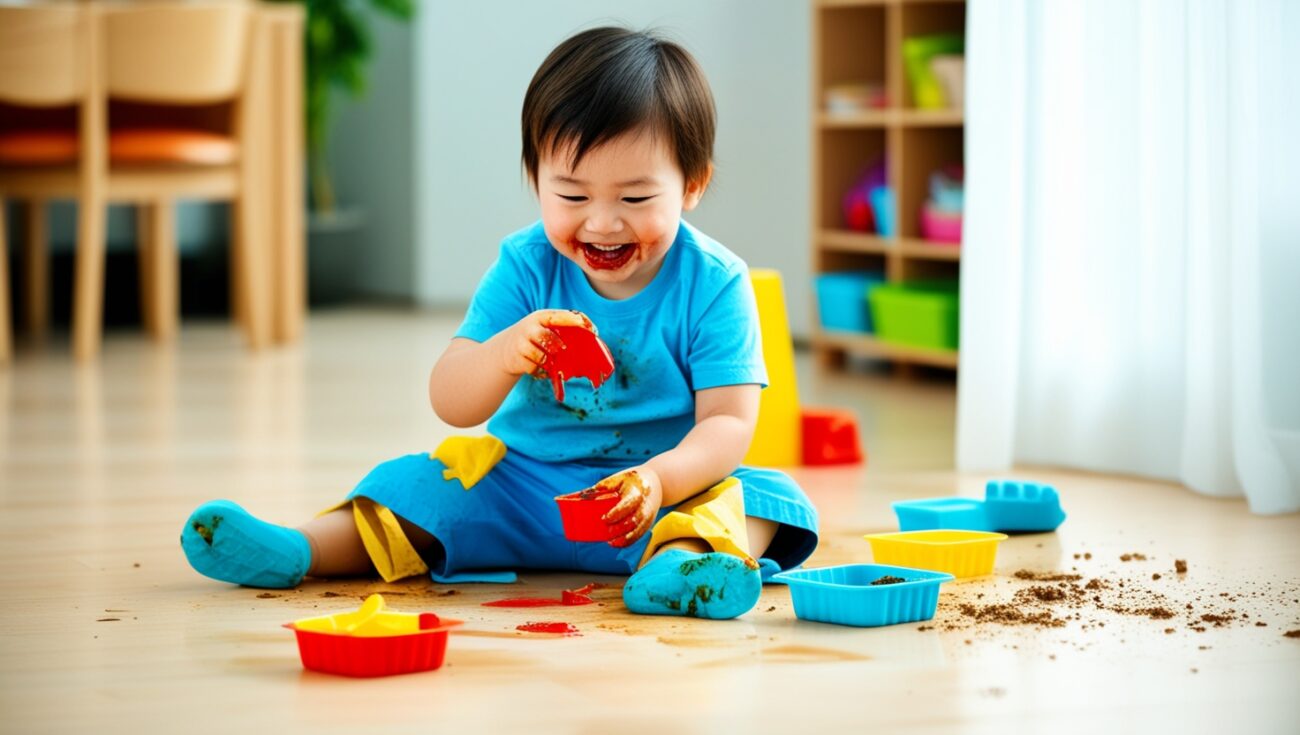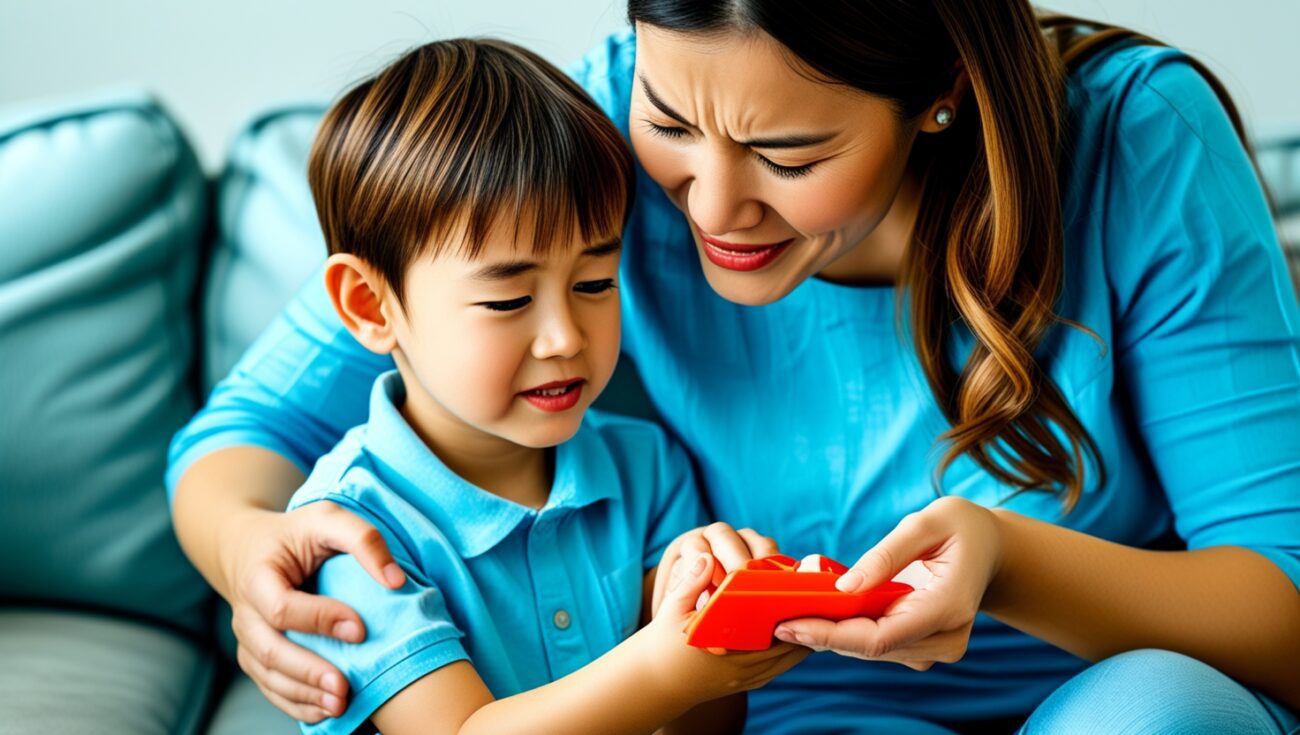الأبوة والأمومة
19
أبريل
How to Handle Mischievous Children with Positive Parenting
Is your child constantly getting into trouble, testing boundaries, or acting out in mischievous ways?It can be challenging to manage children who are always pushing limits, but it’s important to remember: mischievous behavior is often a sign of curiosity, energy, or a need for attention.
In this article, we’ll share effective strategies for dealing with mischievous children in a positive and constructive way. By understanding the root causes behind their behavior and responding with patience and consistency, you can guide your child toward better choices and build a stronger, healthier relationship.
1. Understand the Root Cause of Mischievous Behavior
Before reacting with frustration, it’s crucial to understand why your child is behaving mischievously. Often, there’s a deeper reason behind their actions:
Curiosity and Exploration:Children are naturally curious. Mischievous behavior can simply be their way of exploring their surroundings without...
19
أبريل
How to Build Your Child’s Self-Esteem
Self-esteem is crucial for a child's emotional well-being and success in life. It shapes how they view themselves, how they interact with others, and how they face challenges. As a parent, your role is essential in helping your child develop strong, healthy self-worth.In this article, we’ll explore actionable tips to nurture your child’s self-esteem, empowering them to feel confident, valued, and capable. With the right support, your child can grow up with the confidence to pursue their dreams and overcome life’s obstacles.
1. Show Unconditional Love and Acceptance
One of the most important foundations for building your child's self-esteem is demonstrating unconditional love and acceptance.
Unconditional Love:Children need to feel that they are loved for who they are, not just for their achievements. Express your love often, regardless of their successes or failures. Phrases like, "I love you...
18
أبريل
How to Teach Kids Accountability for Their Actions
Teaching kids’ accountability is one of the most important lessons parents can offer. Accountability helps children develop responsibility, empathy, problem-solving skills, and strong character. If your child often avoids taking responsibility, blames others, or struggles to understand the consequences of their actions, don't worry — you're not alone. In this article, we'll explore simple and effective strategies for teaching kids to be more accountable, helping them grow into responsible, confident individuals.
📹 Don't forget to watch the full video on this topic!
https://youtu.be/D_q15eoaKfA
1. Set Clear Expectations and Boundaries
Before children can be held accountable, they must first understand what is expected of them. Setting clear rules and boundaries lays the foundation for responsibility.
Establish Clear Rules: Be specific about expectations, like “Complete your homework before screen time” or “Clean up toys after playing.”
Discuss Consequences: Explain ahead of time what...
18
أبريل
How to Deal with Hyperactive Children: Parenting Tips
Is your child constantly moving, unable to sit still, or struggling to focus? Parenting a hyperactive child can be both challenging and exhausting. However, with the right techniques, you can help your child manage their energy, build focus, and develop healthy self-regulation skills.
In this article, we’ll explore practical strategies for dealing with hyperactive children, based on expert advice and real-world parenting tips. Whether you're wondering how to help a hyperactive child at home, how to manage hyperactivity naturally, or how to calm an overactive child, you’ll find actionable solutions here.
👉 Watch the full video here for detailed insights!
https://youtu.be/-O1Md-uZiE4
1. Understand the Causes of Hyperactivity
Hyperactivity in children can stem from a variety of causes, including developmental stages, temperament, or underlying conditions like ADHD.
Developmental Energy: Young children, especially under the age of five, are naturally energetic. Their hyperactivity...
15
فبراير
How to Handle Kids Who Struggle with Self-Expression
Do you find that your child struggles to express their thoughts, feelings, or needs? Whether it’s through speech, body language, or even writing, some children find it difficult to communicate effectively. This can lead to frustration, misunderstandings, and behavioral challenges. As a parent, it’s important to recognize that self-expression is a skill that can be developed over time, and with the right guidance, your child can learn to express themselves in healthy and constructive ways. In today’s article, we’ll explore five helpful strategies for parents to support children who struggle with self-expression, allowing them to build confidence in communicating their feelings and needs.
Watch the full video here for more insights on how to help your child express themselves:
https://youtu.be/fUqo-Dx0fls
1. Create a Safe and Supportive Environment
One of the most important factors in helping children express themselves is creating...
15
فبراير
How to Deal with Kids Who Don’t Follow Instructions
Do you often find yourself repeating the same instructions to your child, only for them to ignore or forget them? It’s frustrating when kids don’t follow directions, but it’s a common issue many parents face. Whether it’s at home, in school, or in social settings, children can struggle with listening or responding to requests. The good news is that there are effective strategies to help your child develop better listening skills, understand the importance of following instructions, and reduce resistance. In this article, we’ll go over five practical tips to help address this issue and encourage your child to follow instructions more consistently.
Watch the full video here for more insights into how to improve your child’s listening skills:
https://youtu.be/WjY02Fn3Uww
1. Be Clear and Specific with Your Instructions
When you give instructions, it’s crucial they are clear and easy...
15
فبراير
How to Handle Overlay Sensitive Children
Is your child overly sensitive? Do they get upset, frustrated, or withdrawn easily when faced with criticism or challenging situations? You're not alone. Many children experience heightened sensitivity, and with the right support, they can develop the skills they need to manage their emotions in a healthy way. In this article, we’ll explore practical tips for parents to help their overly sensitive children build emotional resilience, increase their self-confidence, and learn to cope with challenges.
Watch the full video here for more insights into how you can support your sensitive child and help them grow stronger emotionally.
https://youtu.be/T30MhFrzRbo
1. Understand and Accept Their Sensitivity
Understanding your child's sensitivity is crucial to supporting them effectively. Sensitive children are often deeply in tune with their emotions, and while this can be a strength, it can also make everyday challenges feel overwhelming....
15
فبراير
How to Reduce Jealousy Between Children
Are you dealing with jealousy between your children? Don’t worry, you're not alone! Jealousy is a natural feeling among kids, but if not handled properly, it can lead to negative emotions and unwanted behaviors. In this article, we'll discuss effective strategies to reduce jealousy between children. You can also check out the full video on this topic on YouTube where we dive deeper into these strategies.
https://youtu.be/4PKLDicsMnc
The goal is to create a healthy, supportive environment where each child feels valued and appreciated, without negative comparisons. Let’s explore these strategies to help strengthen the bond between your kids and reduce feelings of jealousy.
Tip 1: Encourage Individuality and Celebrate Unique Strengths
Each child is unique and has their own strengths and interests. When children feel appreciated for their individual qualities, they’re less likely to feel jealous of each...
01
يناير
How to Deal with Kids Who Don’t Like Studying: Tips for Parents
Is your child struggling with studying? Are you finding it difficult to motivate them, or does studying feel like a never-ending battle? You’re not alone! In this article, we’ll explore practical tips to help your child develop a positive attitude toward studying and make learning a fun, enjoyable, and rewarding experience. If you're looking for more detailed advice and strategies, be sure to check out our YouTube video where we dive deeper into this topic! Whether your child finds studying boring, difficult, or just frustrating, these tips will give you the tools to create a productive, stress-free study environment. Let’s dive into these practical strategies to help your child develop better study habits and a love of learning!
https://www.youtube.com/watch?v=yIEq5izTnxA
Tip 1: Create a Structured Study Routine
One of the main challenges kids face when studying is a...
01
يناير
Teaching Kids Effective Communication Skills
Are you looking to improve your child's communication skills? You're in the right place! In this article, we’ll explore effective strategies to help your child develop better communication skills, including active listening, expressing emotions clearly, and understanding non-verbal cues. These skills are essential for building strong relationships, fostering social connections, and excelling in academic environments.
If you're interested in a more detailed explanation, be sure to check out our YouTube video, where we dive even deeper into the same topic. Whether through reading this article or watching the video, you’ll find valuable insights on how to enhance your child’s ability to communicate effectively, listen attentively, and express themselves with confidence.
https://www.youtube.com/watch?v=PWHg17uCRjI
Tip 1: Encourage Active Listening
Effective communication begins with active listening. Listening is just as important as speaking. When a child listens attentively, they not only understand...




















